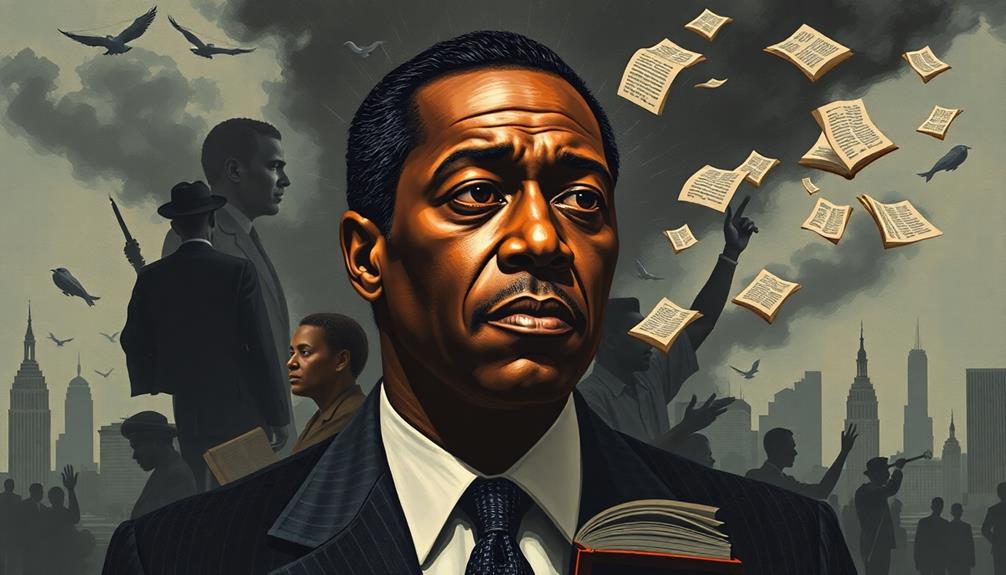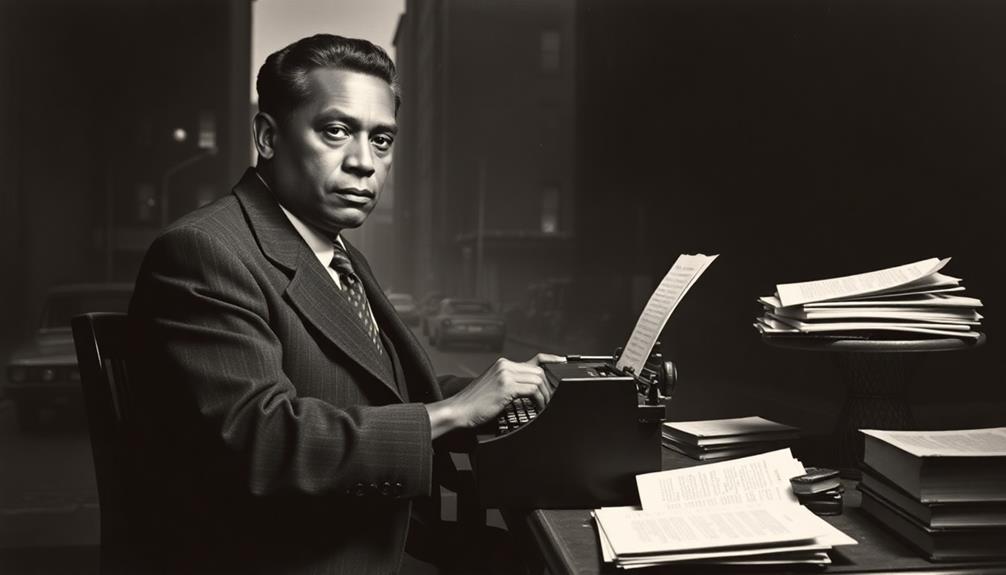You might be surprised to learn that Richard Wright, born in 1908 in Mississippi, wrote *Native Son*. This groundbreaking novel, published in 1940, tackles issues of systemic racism and identity, reflecting Wright's own experiences with oppression. Growing up in poverty and facing racial discrimination shaped his powerful writing voice. In addition to *Native Son*, he wrote other notable works like *Black Boy* and *The Outsider*. Wright's literary legacy continues to influence discussions on race and justice today. If you're curious about the themes and impact of his work, there's much more to uncover.
Early Life and Background
Richard Wright's upbringing in the harsh landscape of Mississippi shaped his worldview and writing. Born on September 4, 1908, he faced the brutal realities of racial discrimination from an early age. Growing up in poverty and instability, he was raised by a single mother after his father abandoned the family.
This challenging childhood left a lasting imprint on his personal experiences and artistic expression, and his early life in a racially charged South informed his later literary activism and themes of social justice. Wright's family later moved to Memphis, Tennessee, where he continued to encounter racial prejudice, ultimately dropping out of school at just 15.
These formative years were marred by systemic oppression, which fueled his desire to articulate the struggles of black culture in America. In 1927, Wright moved to Chicago, immersing himself in the city's vibrant black cultural scene. This environment allowed him to refine his writing and develop a critical perspective on society.
His early encounters with injustice became pivotal in his work, particularly in *Native Son*. Here, Wright portrayed the complexities of race and identity, using his experiences to shed light on the harsh realities faced by African Americans, drawing inspiration from his literary journey that would later propel him to international acclaim.
Influences on Richard Wright
Growing up in the racially segregated South, Wright's experiences profoundly shaped his understanding of systemic racism and oppression. He witnessed firsthand the devastating effects of poverty and racial injustice, which fueled his desire to confront these harsh realities in his writing.
The vibrant atmosphere of the Harlem Renaissance also played a significant role in influencing Richard Wright. The works of African American intellectuals like Langston Hughes and Claude McKay inspired him to explore themes of race and identity, pushing him to articulate the struggles of his community.
Wright's literary journey began as he sought to highlight the complexities of power dynamics and systemic injustice, as seen in his later work, *Native Son*, which reflects the dehumanizing effects of racism.
During the 1930s, Wright's exposure to Communism and socialist ideologies further shaped his perspectives on class struggle and racial inequity. This ideological framework informed much of his later work, including *Native Son*, where he examined these intertwined issues.
His time spent in Chicago allowed him to connect with other African American writers and thinkers, enriching his understanding and expanding his voice in American literature.
These diverse influences combined to create a powerful foundation for Wright's work, making him one of the most significant voices in discussions about race and social justice in America.
Major Works and Achievements

Many consider Richard Wright's major works—*Native Son*, *Black Boy*, and *The Outsider*—as seminal contributions to American literature, each delving into the complexities of race, identity, and social injustice.
*Native Son*, published in 1940, quickly became an instant bestseller, selling 250,000 copies within just three weeks. This groundbreaking novel established Wright as a leading voice in African American literature, tackling themes of racial blindness and oppression. His narratives resonate with contemporary discussions about social injustice and activism, highlighting the ongoing struggles faced by marginalized communities.
Following *Native Son*, *Black Boy* (1945) offered a poignant autobiographical account of Wright's childhood, illuminating the struggles faced by African Americans in the South.
His third major work, *The Outsider* (1953), further explored existential themes and the quest for identity amidst societal constraints.
Wright's influential writings contributed considerably to the Harlem Renaissance and inspired generations of African American writers, helping to shape the civil rights movement. His achievements included receiving the prestigious Anisfield-Wolf Book Award in 1941 for *Native Son*, affirming the impact of his work on discussions about race in America.
Beyond novels, Wright published numerous essays, including "The Ethics of Living Jim Crow," which highlighted the harsh realities of racism and oppression.
Themes in Wright's Writing
Exploring the themes in Wright's writing reveals a profound commentary on the African American experience. His work grapples with systemic racism, illustrating the harsh realities African Americans face daily. In *Native Son*, you see this through Bigger Thomas, a character who embodies the struggle for identity and the sense of alienation that comes from living in a racially oppressive society.
Wright doesn't shy away from depicting violence; he shows how it often becomes a means of survival for marginalized individuals trapped in despair. Guilt and responsibility are central to Bigger's narrative, as he wrestles with the consequences of his actions and societal expectations.
Wright uses this internal conflict to challenge you to think about the moral implications of oppression. His critique of the American Dream highlights how these aspirations remain elusive for black Americans, thwarted by systemic barriers that persistently block their paths.
Through these themes, Wright provides a raw and unflinching look at the complexities of race, identity, and the human condition, forcing you to confront uncomfortable truths about society and the individual's place within it.
Legacy and Cultural Impact

When you explore Richard Wright's *Native Son*, you'll see its profound literary influence that continues to shape discussions on race and identity.
The novel's exploration of systemic oppression mirrors the themes of resilience and defiance found in works like *The Book Thief*, where characters face immense challenges under oppressive regimes acts of defiance.
Bigger Thomas stands as a powerful symbol of racial struggles, reflecting the systemic oppression faced by many.
Additionally, the novel's impact on civil rights movements underscores its relevance in advocating for social justice.
Long-lasting Literary Influence
With its powerful exploration of race and identity, Richard Wright's *Native Son* has left an indelible mark on American literature and culture. Upon its release in 1940, it became an instant bestseller, selling 250,000 copies within six weeks and establishing Wright as a leading voice on African American issues.
The novel ignited essential discussions about systemic racism and its psychological effects on individuals, influencing both the Black Power movement and civil rights discourse throughout the 20th century. Wright's depiction of the struggle against racial oppression resonates strongly today, making *Native Son* a pivotal text in literary studies.
Its themes of social justice continue to inspire writers and activists, ensuring that the conversation around race remains relevant. The novel's adaptations into plays and films further expand its reach, embedding its impact into popular culture and education concerning race issues.
Scholarly interest in *Native Son* remains robust, with over 8,660 items documented in an annotated bibliography from 1983 to 2003, underscoring its lasting significance. You can see how Wright's work has shaped not only literature but also the broader cultural landscape, affirming his legacy as a profound literary figure.
Symbol of Racial Struggles
*Native Son* serves as a powerful symbol of racial struggles, capturing the deep-seated anger and despair experienced by marginalized communities. Richard Wright's portrayal of Bigger Thomas embodies the existential struggle faced by African Americans in a society rife with systemic oppression. This character resonates with readers, illustrating the harsh realities of life for those trapped in a cycle of poverty and discrimination.
Upon its release in 1940, *Native Son* quickly became a bestseller, selling 250,000 copies in just six weeks. It sparked essential discussions about racial struggles and has remained influential in various social movements, especially during the Civil Rights Movement.
The novel's impact extends beyond its initial publication; over 8,660 scholarly works have cited Wright, showcasing its lasting relevance in academic discourse.
Impact on Civil Rights
The impact of Richard Wright's *Native Son* on the civil rights movement is profound and undeniable. By presenting the harrowing story of Bigger Thomas, Wright illuminated the systemic racism and societal failures that plagued African Americans. This novel sparked crucial discussions about racial inequalities, violence, and the urgent need for systemic change.
Consider the following key points:
- *Native Son* serves as a catalyst for civil rights activism, pushing readers to confront uncomfortable truths.
- The portrayal of Bigger Thomas resonates with those affected by the societal structures that perpetuate oppression.
- Wright's vivid depiction of violence highlights the harsh realities faced by African Americans in the early 20th century.
- The book became essential reading in African American literature, influencing generations of writers and activists.
- Native Son laid the groundwork for future civil rights discussions, shaping the discourse around race, poverty, and justice.
Through *Native Son*, Richard Wright not only captured the essence of African American struggles but also provided a powerful lens through which to view the ongoing fight for equality.
This legacy continues to resonate in the civil rights movement today.
Critical Reception of Native Son
When *Native Son* hit the shelves in 1940, it sparked immediate public interest, selling an impressive 250,000 copies in just three weeks.
This response echoed the significance of *Native Son* as a pivotal work that contributed to broader discussions about race in America, much like the narratives of hidden heroes that reveal overlooked contributions to society.
While many celebrated its raw depiction of race and oppression, critics like James Baldwin challenged its portrayal of black characters and reliance on stereotypes.
Today, the novel continues to generate academic debate, showcasing its lasting impact on discussions around race and identity.
Initial Public Response
Upon its release, Richard Wright's *Native Son* quickly became a cultural phenomenon, selling 250,000 copies within just six weeks and firmly establishing Wright as a pivotal voice in discussions about African American experiences.
The novel gained praise for its bold exploration of systemic racism and the psychological effects of oppression, greatly impacting conversations on race and racial identity in America.
However, not all responses were positive. Critics, including James Baldwin, argued that Wright's portrayal of black characters was overly simplistic and tended to reinforce negative stereotypes.
Despite this contention, the book's unflinching depiction of graphic violence and sexual content led to frequent challenges and attempts at censorship in schools. Many educators, however, defended *Native Son* for its ability to foster essential discussions on race.
Key points about the initial public response include:
- Instant bestseller status, reflecting widespread interest.
- Addressing pressing African American issues.
- The novel's groundbreaking work in literature.
- Challenges faced due to its graphic content.
- Ongoing relevance in academic study and debate.
Ultimately, Native Son marked a considerable moment in literature, shaping future discussions around race and justice.
Critiques From Contemporaries
While *Native Son* achieved remarkable commercial success and sparked essential conversations about race, it also drew sharp critiques from contemporaries, particularly concerning its portrayal of black characters. Richard Wright faced significant backlash, especially from influential figures like James Baldwin, who argued the novel reinforced negative stereotypes of African Americans. Baldwin believed it failed to capture the complexity of black identity, which left some readers feeling misrepresented.
The graphic violence and sexual content in *Native Son* led to debates over censorship in educational settings. Critics argued that its inclusion in curricula was fundamental for fostering discussions about systemic racism and oppression, while others sought to limit access, fearing it might perpetuate harmful images.
Though many praised Wright's bold exploration of social injustices, they also felt the novel's bleak outlook lacked hope or solutions for the African American community.
Despite these critiques, *Native Son* remains a groundbreaking work in African American literature. Its impact resonates, influencing future generations of writers and contributing to ongoing dialogues about race relations. The complex reception highlights the delicate balance between representation, critique, and the urgent need for authentic narratives.
Enduring Academic Debate
Amid ongoing scholarly discussions, *Native Son* continues to evoke strong responses from critics and educators alike. Richard Wright's portrayal of Bigger Thomas has sparked debates on the novel's depiction of systemic racism and violence.
While many applaud its brave exploration of identity and race relations, others, like James Baldwin, argue that it reinforces negative stereotypes of African Americans. This duality makes the text a focal point for critical discussions in academic study.
Consider these key points:
- The novel sold 250,000 copies within three weeks, indicating its immediate impact.
- Critics highlight its exploration of systemic racism as a crucial contribution to African American literary canon.
- The graphic depiction of violence invites ongoing controversy and challenges in educational settings.
- Censorship attempts have arisen due to its content, yet many educators advocate for its inclusion in curricula.
- Native Son remains relevant today, reflecting its enduring significance in discussions about social justice.
Ultimately, the novel's complexity guarantees its place in both literary criticism and educational discourse, igniting important conversations about race and identity.
Conclusion
In the tapestry of American literature, Richard Wright weaves a powerful thread with "Native Son." His life, marked by struggle and resilience, fuels the fire of his words, igniting conversations about race and identity. As you close the book, you can almost feel the weight of Bigger Thomas's dreams and despair. Wright's legacy isn't just a whisper in the wind; it's a thunderous call to understand the human experience, urging us to reflect and engage.



